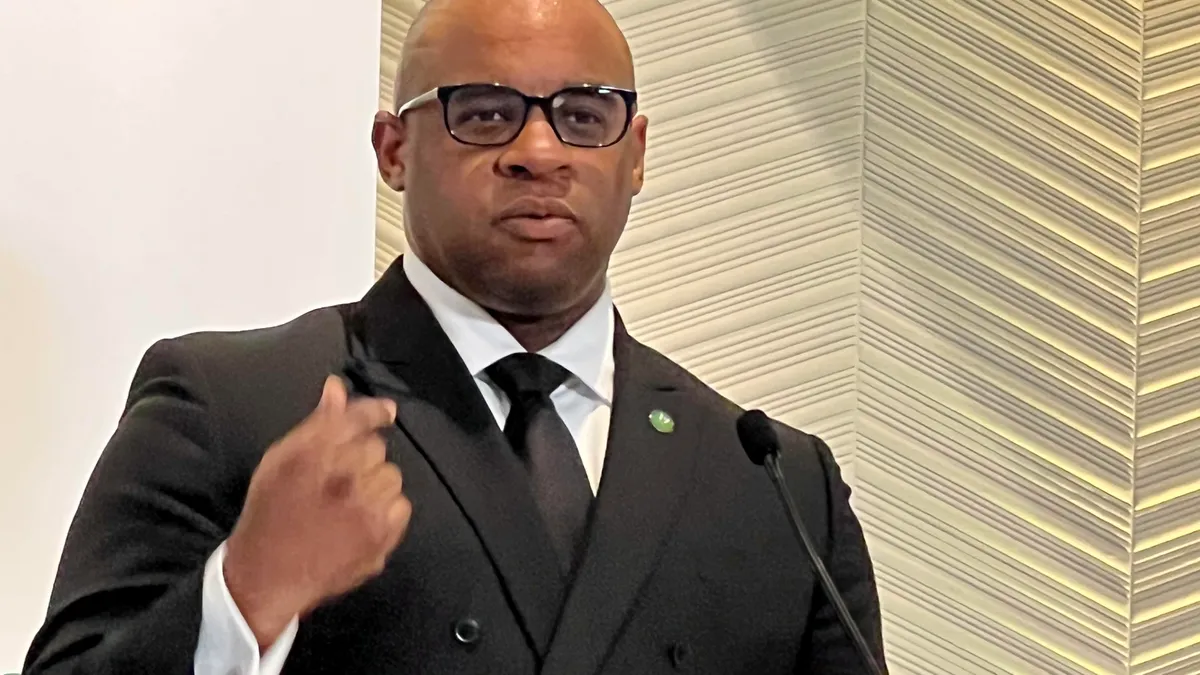Dive Brief:
- Federal Energy Regulatory Commission Commissioner Willie Phillips highlighted the reliability and resilience benefits of interregional transmission projects Thursday at the American Council on Renewable Energy's Policy Forum in his first public speaking engagement since joining the commission.
- Phillips called for changes in how grid operators manage the queues of energy projects that are looking to interconnect to the grid, with a move from a first-come, first-served approach to a first-ready, first-served approach.
- Grid Strategies Founder and President Rob Gramlich said it's "very significant that now four commissioners have publicly raised the issue of interregional transmission capacity, and that Commissioner Philips is joining colleagues in pointing out that planning and cost allocation must incorporate reliability and resilience value."
Dive Insight:
Transmission developers and other stakeholders on interregional projects say that regional transmission operators sometimes don't take into account the reliability value of these projects, according to Phillips, who has fielded such complaints since becoming a commissioner in December.
"Now, the thing I keep asking myself.... in the wake of winter snow here, [is] how in the world, when you assess the benefits of a transmission, do you rate the reliability benefit as zero?" he asked.
"I think we need to be really serious about reliability. I think we have a wake-up call right now. And I believe that transmission development, transmission build-out can be a huge part in addressing reliability and resilience," he said.
FERC has taken a number of recent steps to address current transmission challenges, including creating a joint state-federal task force, in concert with the National Association of Regulatory Utility Commissioners, and issuing an Advance Notice of Proposed Rulemaking (ANOPR) last July on regional transmission planning, cost allocation and generator interconnection.
There is "a clear need for substantial transmission build-out to accommodate new generation," Phillips said while highlighting the ambitious renewable energy goals around the country.
"In order to get these necessary transmission projects financed, we must address the continuing barriers to regional and interregional transmission investment," he added.
Grid Strategies's Gramlich said that many parties have demonstrated in the ANOPR docket that "consumers across wide areas benefit from large-scale regional and interregional transmission, and yet our current planning and cost allocation approaches generally fail to take that into account."
Philips essentially said he agreed with that, Gramlich noted, adding, "it seems to me that FERC has an obligation under the Federal Power Act to change the planning and cost allocation regulations currently in place around the country."
Phillips raised the example of interregional transmission between the PJM Interconnection, the Midcontinent Independent System Operator, and the Southwest Power Pool during Winter Storm Uri, and how it kept the lights on in the Western part of the Eastern Interconnect, benefiting customers there, Gramlich noted.
"Prospectively, such transmission costs should be assigned in part to consumers on both sides, to reflect the benefits. That approach would be consistent with all of the court rulings over the last decade on cost allocation, and the current approach is out of step with the beneficiary pays policy," he said.
ACORE President and CEO Gregory Wetstone also pointed to Phillips' comments about the need for new transmission to unlock renewable energy resources and increase the reliability of the grid as a key takeaway from his remarks.
In addition, "ACORE was encouraged by Commissioner Phillips’ sincere desire to engage with stakeholders and identify best practices as the commission undertakes rulemaking processes to ensure a more reliable, affordable and sustainable energy system for Americans," Wetstone continued.
Phillips also addressed the question of what FERC can do to tackle the large interconnection backlog for clean energy projects around the country.
"We're going around to every [regional transmission organization and] we're looking for best practices...We're looking for...what's working around the country to unlock these resources," he said.
Phillips said a more clustered approach to interconnection queue management should be prioritized, calling for a "first-ready, first-served" system.
"I think we need to start looking at what projects are actually ready to have shovels in the ground. And then we can incentivize properly the developers and everyone in the system to make sure that those projects get selected," he said.














